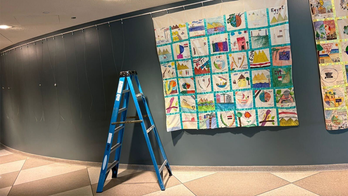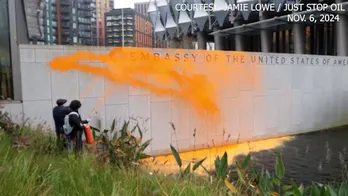Skeletal remains of man, woman discovered in Pompeii offer chilling details of final moments
The newest discovery in the ancient city of Pompeii details the final moments of a man and a woman before the city of Pompeii was destroyed by Mount Vesuvius.
During the excavations of Region IX, Insula 10, in Pompeii, the skeletal remains of a man and a woman were found, according to a press release from the Archaeological Park of Pompeii shared on Monday.
"We know the woman was between 35 and 45 years of age, and the man was much younger, between 15 and 20 years of age," Sophie Hay, an archaeologist with the park told Fox News Digitial in an email. "We do not know the relationship between them nor their social status."
VIOLENT DOODLES MADE BY CHILDREN 2,000 YEARS AGO RAISE EYEBROWS
The woman had several valuable objects on her person that further contribute to the tragic story of her final moments.

A recent discovery made in Pompeii included two skeletons, a man and a woman, who attempted to find shelter in a small room from Mount Vesuvius' deadly eruption. (Archaeological Park of Pompeii)
"The woman had on her person a purse and probably a small casket both filled with precious and valuable objects such as gold, silver and bronze coins, small engraved gemstones, some pendants, and a pair of gold and pearl earrings," Hays told Fox News Digital.
"We know the objects had a monetary value, but we will never know what sentimental value they may have had for her, nor even if they belonged to her. The items must have represented something in the moments of chaos and terror that she thought would be important to take, whether for their monetary value or, especially in the case of the jewelry, personal belongings that meant something to her."
2 SKELETONS FOUND BURIED IN POMPEII REVEAL EARTHQUAKES ACCOMPANIED ERUPTION OF MOUNT VESUVIUS
The two sought refuge in the small room, where they found themselves trapped.
"As with each victim of the eruption, their individual death tells us a micro-story of the last moments of their lives. The very nature of this discovery – a man and a woman trapped in a room during a violent volcanic eruption – perhaps gives us a glimpse as to how absolutely terrifying the moments before their deaths must have been," Hays told Fox News Digital.

The two skeletons were found in a room also containing a wooden bed, a stool, a chest and a table with a marble top. (Archaeological Park of Pompeii)
"In this case, the most significant thing we have learned is that they died at different stages of the eruption having both protected themselves against the 18 hours of falling pumice. The man was trapped in the corner of the room and the perimeter wall collapsed on him during an early stage of the pyroclastic flow, and the woman who had partially fallen onto the wooden bed in the room had died sometime later in another wave of the pyroclastic material," Hays said. "These people decided to seek shelter in their home rather than flee, and the room in which they sought safety became their tomb."
Since Mount Vesuvius erupted in A.D. 79, claiming the lives of about 2,000 people living in Pompeii, the city buried in ash was rediscovered by explorers in 1748, per History.com.
RESEARCHERS USE AI TO DECIPHER ANCIENT ROMAN TEXTS CARBONIZED IN DEADLY MOUNT VESUVIUS ERUPTION
That volcanic ash covering the ancient city left much of it preserved and discoveries to be made.

This recent discovery sheds more light on the tragedy that happened in Pompeii almost 2,000 years ago. (Archaeological Park of Pompeii)
Since the site was rediscovered, it has been visited by millions of tourists each year and is a dig site for archaeologists to unearth historic finds that further tell the story of life in the ancient city.
In 1997, it was named a UNESCO World Heritage Site.
Other recent findings in Pompeii include a prison bakery where enslaved workers and donkeys were held, and a banquet room filled with artwork depicting mythological characters inspired by the Trojan War.
CLICK HERE TO GET THE FOX NEWS APP
The discovery of the man and woman was found south of the Roman shrine with rare blue paint covering the walls of the room that was uncovered in June.
Disclaimer: The copyright of this article belongs to the original author. Reposting this article is solely for the purpose of information dissemination and does not constitute any investment advice. If there is any infringement, please contact us immediately. We will make corrections or deletions as necessary. Thank you.







